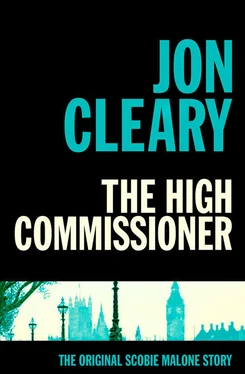1 ...6 7 8 10 11 12 ...16 “Do you still want me to phone the Commissioner? I mean, I don’t want to take you away from this conference if you feel—”
Quentin looked at his watch. “It’ll be almost five o’clock in the morning out there. Do you want to phone him at his home?”
“How soon could I get through?”
“I can get you priority.” He smiled wryly; from now on all jokes would be against himself. “I may not have that privilege much longer.”
Malone checked Leeds’s home phone number from his note-book and gave it to Quentin. The latter picked up the phone and dialled. “This is the Australian High Commissioner at—” He gave his own number. “I want a top priority person-to-person call to Mr. John Leeds at—” He read from the note-book Malone held out to him. “Will you ring me back, confirming and telling me how long it will be?”
He hung up the phone and Malone said, “If the Commissioner okays this, you know I can’t let you out of my sight for those four or five days. Technically you’re already under arrest.”
“I wonder if I could get the P.M. to put up bail for me?” Again he smiled wryly; then he said, “You won’t trust me?”
“Don’t put it like that, Mr. Quentin.”
“I’m sorry.” He looked curiously at Malone. “I have the feeling you’re not enjoying this assignment. Am I right?”
“There’s a lot of police work I don’t enjoy. We’re not all bastards, you know.” Malone held back. He was coming to like this man more than he should. Flannery had been right: He’s not a bad bloke at all .
“I suppose it’s like politics.”
“And diplomacy, too?”
Quentin looked at him, then nodded. “Everything is compromise. Only the saints escape, and they never go into politics or diplomacy.”
“Or police work,” said Malone, and after a slight hesitation both men smiled at each other.
The phone rang and Quentin picked it up. After a few words he looked at Malone. “The call will be through in twenty minutes.”
“I hope for your sake he’s in a good humour at five o’clock in the morning.”
“Not for my sake,” said Quentin, hanging up the phone. “That’s not why I’m asking for the extra time.”
“Sorry,” said Malone, and began to wonder what sort of man Quentin had been twenty-three years ago when he had murdered his wife.
“I have to get dressed now. There’s a reception at one of the African embassies. Do you want to come with me to that?”
“Am I dressed for it?”
Quentin looked at the very pale grey suit, the blue nylon shirt and the green-figured tie that looked like an aunt’s present. “At the risk of offending you, Sergeant, I don’t think you’re dressed for anything in London. Where do you buy your clothes back home?”
Malone grinned: he had been criticised many times before for his lack of interest in clothes. “The first shop I come to. I’ve never been much of a dresser.”
“I admire your modesty, but you certainly speak the truth. Have you ever worn tails?” Malone shook his head. “You’re going to tonight. We’re about the same size, you can wear my spare set. What size shoes do you take?”
“Eight and a half. I haven’t got policeman’s feet.”
“The same size as mine. You can step into my shoes tonight, Sergeant, have a look at my world. You might understand why I’m going to be reluctant to leave it. It has its drawbacks, but I enjoy it.”
Malone began to protest. “Look, I don’t want to crowd you, sir – I’ll wait outside—”
“I feel I owe you something, Sergeant—” He gestured at the phone. “If I’m to keep you here in London longer than you expected, I’ll see you get more out of it than waiting around in doorways.”
“What will your wife say? I mean about lending me your clothes? Won’t she ask some awkward questions?”
“My wife trusts me, Sergeant. She never asks too many questions. A diplomat’s wife learns not to.” Then he sighed. “There’ll be enough questions after I’ve told her who you really are.”
Chapter Three
“He has discovered the elixir of adolescence,” said the donnish-looking Labour M.P. “Any day now I’m expecting him to call the House dining-room the tuck shop.”
“He is the sort of African who wears his colour on his sleeve,” said the light-skinned Indian.
“Her intelligence, my dear, is second to anyone’s you care to name,” said the wife of the junior Foreign Office man.
“Australia, I’m told, is the world’s largest suburb,” said the man from Commonwealth Relations.
Malone almost popped the stud of his collar as he heard the last remark. He was about to move forward to break up Commonwealth Relations when a restraining hand caught his arm.
“Ignore them, Mr. Malone. Diplomatic receptions are very much like women’s tea parties, only a little more elegant and epigrammatic.” Lisa Pretorious stood beside him, her tanned shoulders and arms offset by the pale pink of her gown. A South American second secretary went by, all teeth and wink, and she gave him a cool smile that was both an acknowledgment and a rebuff. “Don’t you go to them in Canberra?”
Malone shook his head. “I’m known back home for my undiplomatic behaviour, so I’m never invited.”
“They should invite you. You look quite decorative in tails.” She looked him up and down. “I’m quite proud to have you as my escort. When Mr. Quentin suggested it—”
“You thought I’d be wearing my own suit?” She nodded, and now it was his turn to look her up and down. “Don’t you diplomatic types ever blush? You’ve just insulted me—”
“I’m not a diplomatic type, I’m just a private secretary. But one learns the tricks. Any diplomat who blushed would be out of a job at once.”
“You could be a little more diplomatic in telling me I’ve got no taste.”
“Mr. Malone, I was born in Holland and I’ve spent seven years in Australia – my formative years, if you like to call them that. What sort of training is that for subtlety?” Suddenly he laughed and she smiled in return. “That grey suit of yours is pretty awful, you know. You looked like an unsuccessful racecourse tipster. I think you should understand why I was so suspicious of you, why I didn’t want you to see the High Commissioner.”
“What’s he like to work for?” Malone asked the question idly, just to keep the conversation going: he was enjoying the company of this good-looking, frank girl. Then he regretted the question: he was already becoming too interested in Quentin.
“The best boss I’ve ever had. I’ve been a doctor’s receptionist, secretary to an advertising man, a guide on a conducted tour of Europe, oh, and several other things. I’d never done anything like this till I came to work for Mr. Quentin.” She looked about the crowded room that moved like a wind-ruffled pool under the crystal sun of the huge chandelier. Conversation floated like a swarm of butterflies: words were coloured, had a polish and exoticism about them that Malone had never heard before. “I don’t think I want to do anything else now. I hope Mr. Quentin remains High Commissioner for years.”
Across the room Malone saw Quentin and his wife moving slowly from group to group, from Africa to Asia to the Americas: everywhere they were greeted with genuine smiles of welcome. “Is he popular?”
She nodded. “He’s considered to be the best man Australia’s ever had in London. But I don’t think they really appreciate that back home.”
“No,” he said, and tried not to load his voice. He looked at her, changing the subject quickly: “You’re Dutch, but you think of Australia as home, do you?”
“My parents are settled there, in Melbourne. They’ll never come back to Europe. So I look on Australia as home. One needs roots somewhere.”
Читать дальше












